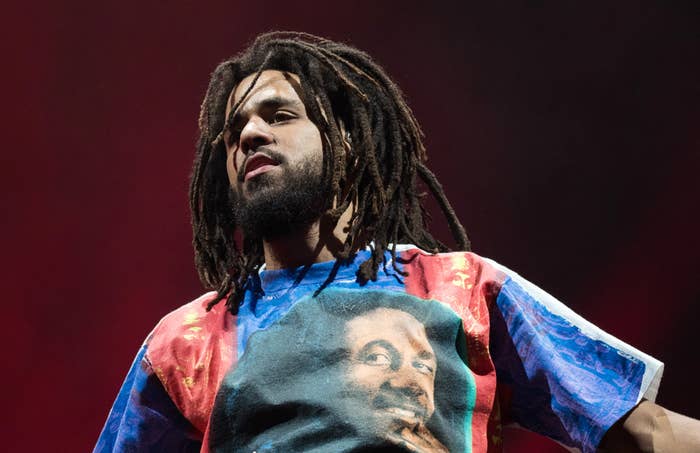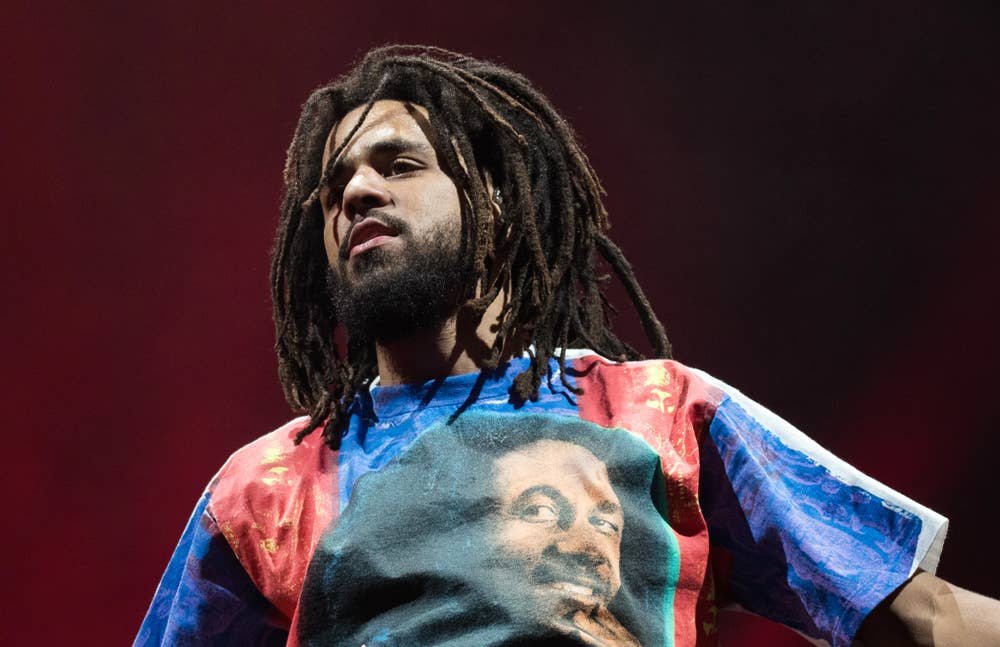
Back in January, the attention of the music world turned to Atlanta as Dreamville Records went to work on their third compilation album, Revenge of the Dreamers III. The goal was simple: Get a bunch of talented artists in the same building together and record an album in 10 days. Now, six months later, we're just days away from the July 5 release date, and the label has dropped a 29-minute documentary that gives a peek inside the recording process. So, what did we learn? Here are the biggest takeaways from Dreamville's Revenge documentary.
J. Cole is tired of working alone
J. Cole reveals that he invited so many people to the ROTD3 recording sessions because of his desire to collaborate with more artists who he admired. For years, the narrative around him has been that he's an artist who never works with others and prefers to stay secluded, but he wants that to change. "When I meet other artists in the game, I really do fuck with them and have great conversations with them," Cole says. "But the outside world don't know that, because I'm so secluded in a sense. And I realized that." He adds, "My whole career, I've been fuckin' in a room with me and at most a select few people I fucked with," he explains in the beginning of the documentary. Now, he thinks he’s reached a point where he doesn't want to "look back 20 years from now and be like, 'I never worked with nobody, I never had no fun.'" —Jordan Rose
The golden ticket invitations took on a life of their own
Throughout the month of January, timelines were flooded with yellow invitations to the recording sessions, posted by everyone from Ski Mask the Slump God to DJ Khaled. At the time, it was clear that the "golden ticket" invitations brought additional attention and intrigue to the otherwise secretive sessions, but now we know they altered the nature of the recording process, too. Once the invitations were public, everything snowballed and more people got invovled. "Cole's like, 'Man, we should make invitations,'" Dreamville president Ibrahim Hamad says of the concept. "I was like, 'Damn, that's actually kinda genius.' We literally got it out to people the day we got here, when we were supposed to do it ahead of time. That day, we just started seeing people posting, posting, posting." He adds, "That shit just took on a life of its own. Not only was the whole internet talking and wanting to know what was happening, but now it opened the door for other people who wanted to come through." —Eric Skelton
Limited studio space encouraged collaboration and competition
Due to the sheer number of artists invited, every booth was packed. Because there were only three rooms that people could technically record in, there was always high demand for studio space. Naturally, each room took on its own unique vibe. "This is the big room where ten n****s get on one song," Bas says about one of studios. "It’s like a shark tank." Artists and producers were forced to come with their A game because "it's really easy to not get included if you just walk around and chill." This added a layer of friendly competition to the sessions. —Jordan Rose
This was a meeting point of all different styles, from trap to soul
As we've heard on high-energy singles like "Costa Rica," the ROTD3 sessions produced sounds that strayed far outside of the soulful, lyric-driven rap that most have come to expect from Dreamville. In some rooms, artists were cooking up trap music. In others, singers like Ari Lennox were laying down mellow R&B jams. "People come from different worlds," Ibrahim Hamad explains. "There are a lot of producers here who are heavy on the trap shit. And there are some producers who are heavy on the soulful shit. Just putting that all together, it's been a journey." —Eric Skelton
Sessions were competitive but positive
Everyone at the ROTD3 sessions were trying to one-up each other throughout the ten days, but they were also happy to be working with new people. "It's competitive," artist and producer Ron Gilmore Jr. explains. "Friendly, but you know there's an underlying competition [...] When I hear a record that's tight, I’m like, 'Damn, I wish I would have made that shit.' I instantly go and start making some shit." Several artists would write over the same beat at once, competing with each other to make it on the final version of the song. Throughout the documentary, though, artists stress how positive the energy was. "I don’t know who else could’ve pulled some shit like this together and it be all positive," Smino reflected. "It takes somebody like Cole, you know what I’m sayin', for it to make it some positive ass shit." —Jordan Rose
Buddy was everywhere
One of the young artists who took advantage of the chance to collaborate the most was Buddy, who recorded "at least 20 verses in 3 days." He saw his chance to make an impression in front of heavy-hitters, and ran with the opportunity. "I’m on everything!" he says at one point in the documentary. Other artists referred to him as a lightning spark and said he brought much-needed energy to the sessions. —Jordan Rose
It was a new, inspiring experience for everyone (including J. Cole)
Perhaps the biggest takeaway from the documentary is how inspired everyone was by being involved in such a unique, ultra-collaborative creative environment. The doc ends with a message from J. Cole, who explains how he's never seen anything like this in his career before. "I'm really proud of everybody involved in this, especially on the Dreamville artist side," he says. "I'm happy for all these producers and artists who have never had an experience like this. I've never had an experience like this, and I've been in this shit ten years. I know for them, sometimes it's easy to lose hope as an artist or producer in this game. I feel like, honestly, more things like this would do so much for music, period. Because the real life blood of music is these unheard producers who are bubbling and working hard and not getting no recognition. They do this shit for free all the time, but they just never get heard. Things like this empower them. It gives them a shot. It's like, 'Yo, how many people here got a song now with J.I.D or Bas or T.I. just hopped on their shit.' It's like, a week ago, that didn't even seem possible." He adds, "I don't know. I just really fuck with this shit." —Eric Skelton

